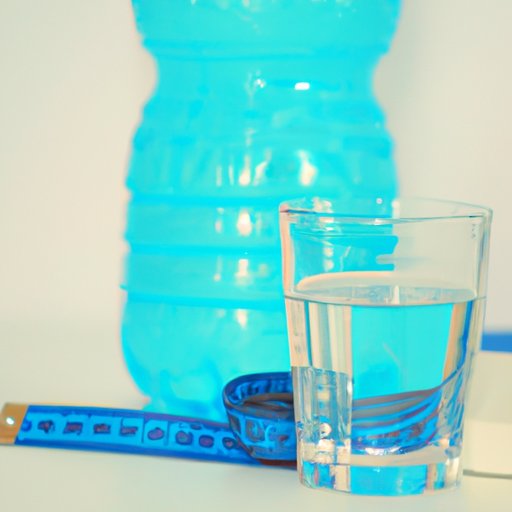Introduction
Weight loss is the process of losing body fat through healthy eating habits, physical activity, and other lifestyle practices. It can be difficult to achieve weight loss goals when you cannot exercise due to an injury or medical condition. Fortunately, there are several ways to lose weight without relying on exercise alone.
Reasons why people might not be able to exercise include physical limitations, mobility issues, chronic health conditions, or a lack of access to a gym or equipment. Even if you don’t have the ability to exercise, you can still make progress towards your weight loss goals.
This article will provide a comprehensive overview of how to lose weight when you can’t exercise. We’ll discuss the importance of eating a balanced diet, counting calories, intermittent fasting, portion control, and drinking more water.
Eating a Balanced Diet
The foundation of any successful weight loss plan is a balanced diet. Eating nutrient-dense foods that are high in protein, healthy fats, and complex carbohydrates is essential for proper nutrition and weight loss. These foods should also be low in added sugars, refined grains, and unhealthy fats.
Healthy sources of proteins include lean meats, fish, eggs, and plant-based proteins such as legumes, nuts, and seeds. Healthy fats can be found in avocados, olive oil, nut butter, and fatty fish. Complex carbohydrates can be found in whole grains, fruits, and vegetables.
Here are some tips for eating a balanced diet:
- Eat plenty of vegetables and fruits, which are packed with vitamins, minerals, and fiber.
- Choose lean proteins, such as chicken, fish, and tofu.
- Include healthy fats, such as olive oil and avocado.
- Focus on complex carbohydrates, such as oats, quinoa, and sweet potatoes.
- Avoid processed foods, sugary drinks, and refined carbohydrates.
Counting Calories
Counting calories is another effective way to lose weight when you can’t exercise. Knowing how many calories you need to consume each day can help you stay on track and ensure you are getting enough nutrients while still losing weight.
To determine how many calories you need per day, you can use an online calorie calculator. This will take into account your age, gender, height, weight, and activity level to give you an accurate estimate of how many calories you should be consuming.
The benefits of counting calories include ensuring you get enough nutrients, helping you create a calorie deficit, and understanding what and how much to eat. Here are some tips for counting calories:
- Track your calorie intake with an app or website.
- Be mindful of portion sizes when eating.
- Drink lots of water to stay hydrated.
- Choose nutrient-dense foods with fewer calories.
- Limit processed and sugary foods.
Intermittent Fasting
Intermittent fasting is a popular weight loss strategy that involves alternating periods of eating and not eating. This can be done by restricting your eating window to 8 hours a day and fasting for 16 hours a day.
The benefits of intermittent fasting include increased fat burning, improved metabolic health, and reduced inflammation. Here are some tips for intermittent fasting:
- Start with shorter fasting windows, such as 12 hours.
- Stick to a consistent schedule.
- Drink plenty of water during the fasting period.
- Eat nutrient-dense foods during the eating window.
- Avoid snacking between meals.
Portion Control
Portion control is another important factor in weight loss. Understanding serving sizes and limiting your portions can help you stay within your calorie range and prevent overeating.
The benefits of portion control include better control over your food intake and improved digestion. Here are some tips for portion control:
- Measure out your servings to get an accurate idea of portion size.
- Eat slowly and stop eating when you feel full.
- Fill half of your plate with vegetables.
- Choose smaller plates and bowls.
- Avoid eating directly from the package.
Drinking More Water
Staying hydrated is important for overall health and can also help with weight loss. Drinking water can help you feel full, reduce cravings, and boost your metabolism.
The benefits of drinking more water include improved digestion, better skin health, and increased energy levels. Here are some tips for drinking more water:
- Carry a reusable water bottle with you throughout the day.
- Set reminders to drink water throughout the day.
- Drink a glass of water before meals.
- Add lemon or cucumber slices to your water for flavor.
- Eat water-rich foods such as fruits and vegetables.
Conclusion
Losing weight without exercise can be challenging, but it is possible. By focusing on eating a balanced diet, counting calories, intermittent fasting, portion control, and drinking more water, you can make progress towards your weight loss goals.
The key takeaway points from this article are:
- Eat a balanced diet that includes proteins, healthy fats, and complex carbohydrates.
- Determine your daily calorie needs and track your intake.
- Try intermittent fasting for a set period of time each day.
- Practice portion control by measuring out servings and limiting snack foods.
- Drink at least 8 glasses of water per day.
No matter your fitness level or current health status, you can still take steps to lose weight. With proper nutrition, portion control, and plenty of water, you can reach your weight loss goals without having to exercise.


